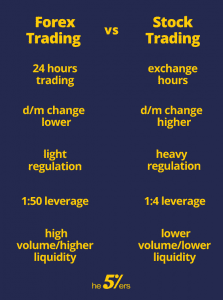Forex Trading Vs Stock Trading – Which One Should You Be Trading?

Table of Contents
- Let’s take a look at how the two markets stack up against each other.
- The Similarities Between Trading Forex and TradingStocks
- The Differences Between Trading Forex and Stocks
- Trading Regulation
- Leverage/Margin
- Trading Hours
- Volatility
- Market Size and Volume
- Liquidity
- Catalysts and Price Influencers
- Commission and Trading Costs
- Number of Assets
- Dividends
- Real Assets vs. A Contract
- What Kind of Trader Are You?
- Which Market is Better for You?
- Forex Trading vs Stock Trading which is more profitable
- Forex Trading vs Stock Trading The Bottom Line
Let’s take a look at how the two markets stack up against each other.
Forex Trading vs Stock Trading, In this article, we will help you to decide which of the markets is more suitable for you as a trader.
Active investors with an internet connection have almost instant access to a wide range of trading tools, from stocks and industrials to futures and forex. And while the markets are all somewhat interconnected, there are stark differences between them.
That is why when deciding which market to trade in, all of the differences and similarities need to be examined before making the right decision. It’s also very important to know yourself and which trading style you’ll be bringing to whichever market you decide to jump into.
In addition to understanding yourself and your trading style, the other main factor in determining which market is right usually rests on an investor’s risk tolerance.
If you’re more of a buy and hold a type of investor, stocks are probably better for your style. However, if you’re a short term trader who doesn’t mind volatility, markets like forex might be more your thing.
The Similarities Between Trading Forex and TradingStocks
The main similarity is that success in both markets depends on taking advantage of constantly changing prices.
Most Forex and stocks trader uses the same popular strategy, technical analysis.
Both traders use the same methods of price action analysis, to determinate how to trade.
Both stock traders and Forex traders need discipline and work plan to succeed.
Without discipline, your ability to succeed in trading is very low.
The Differences Between Trading Forex and Stocks
Trading Regulation
Trading on major exchanges is done under heavy regulation whereas forex trading has a lot less oversight and regulation.
For some traders, the heavy hand of regulation present in the stock market may feel too restrictive. However, these regulations protect investors in ways they are not covered in the forex market.

Leverage/Margin
This is one of the most appealing aspects of forex to traders who are not risk-averse. In normal stock trading, the maximum leverage available is 4:1. On top of this relatively low ratio, there are also qualifying requirements a trader needs to go through before being approved for it. Many traders never qualify for a margin account.
In the forex market, things are very different. In order to gain access to an account with high leverage, a trader only needs to open an account. Once active, a trader can access up to 200:1 leverage in some countries. However, in the United States, that number is limited to 50:1.
Trading Hours
For traders who operate the best outside of the standard workday, forex trading is a great option.
Unlike the stocks which are limited to exchange hours (9:30 am to 4 pm EST Monday – Friday), the forex market is a continuous market that stays open around the clock. For traders who come alive at night or who simply prefer a custom-built schedule, forex’s market access is a big plus.
Volatility
Many short terms and day traders rely on volatility in order to profit on sudden swings in the market.
This practice is far more common in the forex market whereas buy and hold investors will find the stock market a more suitable place to trade.
Investors with a stomach for volatility might find success in the forex market while those who do not work well with it, might choose to stick with the stock market.

Market Size and Volume
A quick glance at both markets shows an enormous difference in size between the two markets. Estimated at trading $5 trillion a day, the forex market dwarfs the combined value of all of the world’s stock markets combined. Those markets trade around $200 billion a day.
The high volume of the forex market means traders can generally get their orders executed at closer to the prices that they want. The higher liquidity of the forex market also means that traders are better equipped to enter and exit the market.
Liquidity
The first thing to understand about liquidity is that the forex market is full of it.
This is because there is always a ton of currency out on the market to be traded.
Since the market operates 24 hours a day, positions can be opened and closed all the time which adds to the massive amount of liquidity.
In contrast, while some blue-chip stocks will have relatively high liquidity, the smaller assets in the stock market will have far less.
Catalysts and Price Influencers
In the world of forex, price is mainly influenced by global economic news.
This differs from stock prices which are mostly moved by news pertaining to the company associated with stock or the industry which the company falls under.
Both markets are prone to shifts in response to large scale changes in economic conditions or political shakeups which may interfere with the economy.
Commission and Trading Costs
Here’s another area where trading forex or stocks vastly differ.
In forex, most brokers don’t charge a commission on trades. Rather, they make most of their money on the spread. In contrast, investors in the stock market usually have to pay the spread as well as a commission to the stockbroker.
Number of Assets
In the stock market, there are thousands of assets to be traded.
In forex, since investors are only buying and selling currency pairs, there are only two assets being moved.
Dividends
stocks holders can receive dividends, while the stock will drop as dividend high, companies that share dividends are profitable companies, and usually, their stock will return to the price before.
In Forex, however, there is no dividend sharing.
Real Assets vs. A Contract
When you hold stocks, you are holding real, tangible assets. However, in forex, you hold a contract between yourself and the regulated broker.
What Kind of Trader Are You?
Now that you know the similarities and the differences between these two markets, the next step to determining which is best for you is to ask yourself what kind of trader you are.
Are you a short-term trader, also known as a scalper? Are you a medium-term trader, or are you, long-term trader?
Short- Term (Scalping): Both, stock market and forex market are relevant for short term traders, there is no big difference for this type of traders.
Medium-Term (Swing): The stock market is closed every day and therefore suffered from much more GAPS in the price which is more risky for the swing traders.
Long-Term TRADING: Holding positions in the stock market for the long term can be rewarding by Dividend in some stocks.
Which Market is Better for You?
In order to know which market you’re better suited to trade in, it’s crucial that you understand your trading personality and style.
When you know yourself well, you can match your strengths with the market that best plays to them.
Understand your approach to risk, the times you trade at your best, the duration with which you’d like to hold on to or sell your trades, and your overall goals and then you’ll be able to decide which market you’re more likely to thrive in.
Forex Trading vs Stock Trading which is more profitable
which market is more profitable? both markets have the same potential.
the answer is it depends. It depends upon the market conditions, the timing, and most importantly, your skill.
The leverage in the stock market is limited to 1:4 while the leverage in the forex market can get up to 1:50 in a regulated broker, Remember that leverage cuts both ways. It can be a formidable accelerator or it can crush you.
In contrast, today still the most profitable way is to Buy-&-hold stock for the long term.
as for traders, The peoples who made the money, the ones who really profited were slow and steady investors. they had money/risk management, They did a lot of homework, spent a lot of time researching and constantly monitored their holdings. Those people did well.
These are traits that if you adopt and realize that it is not a “game”, this is life, you can earn both Forex and Stocks.
And this is probably the real answer to the question, not which market is more profitable, these, do you have the skill to be a serious investor/trader… then maybe the sky is the limit for you!
Forex Trading vs Stock Trading The Bottom Line
Ultimately you’ll need to weigh the pros and cons of each market to decide which path is ideal for your personality, skills, and style.
But if you’re a self-motivated, not afraid of volatility, short term preferred type of trader, the forex market might just be right for you.
Whichever market you choose to jump into, just make sure you stick with your trading plan, continually learning, and believe in your abilities while respecting your shortcomings. A lucrative career in trading is within reach if you’re willing to commit and do the hard work necessary.




Forex is better.
Yes, it's fast and profitable.